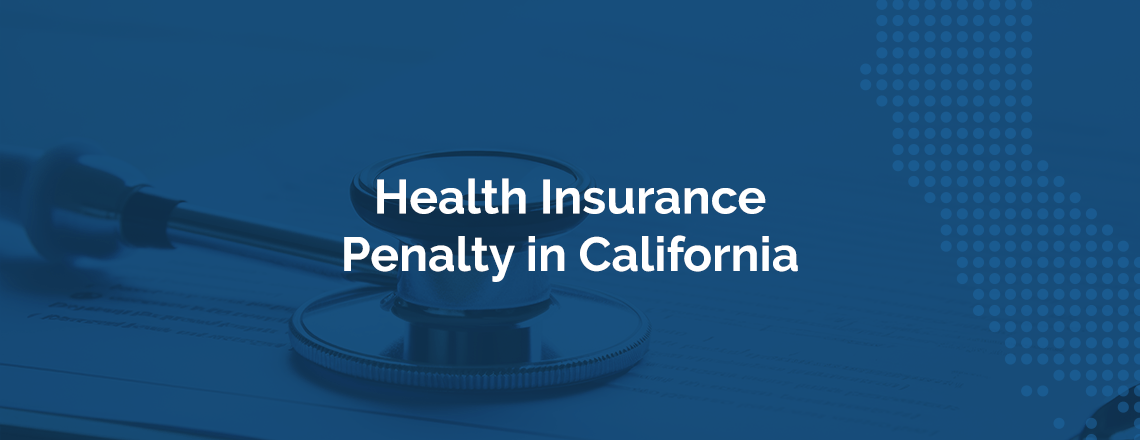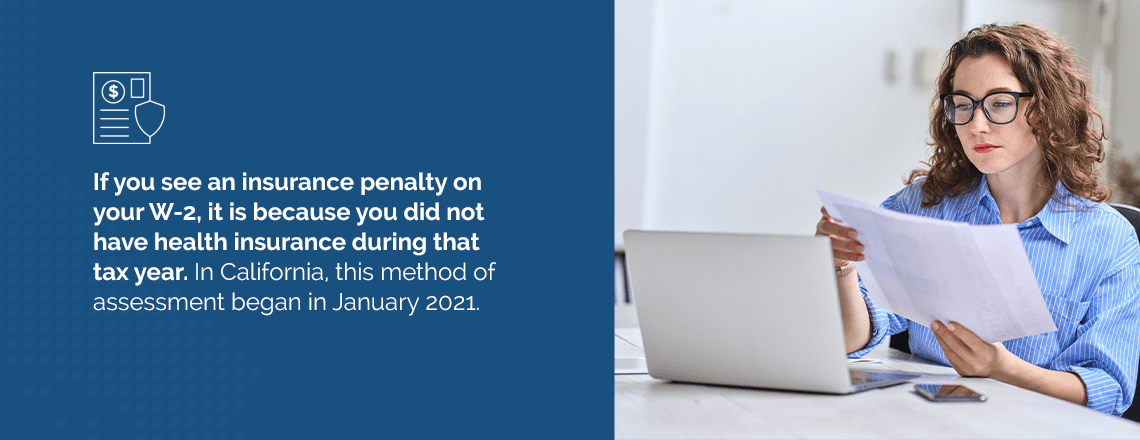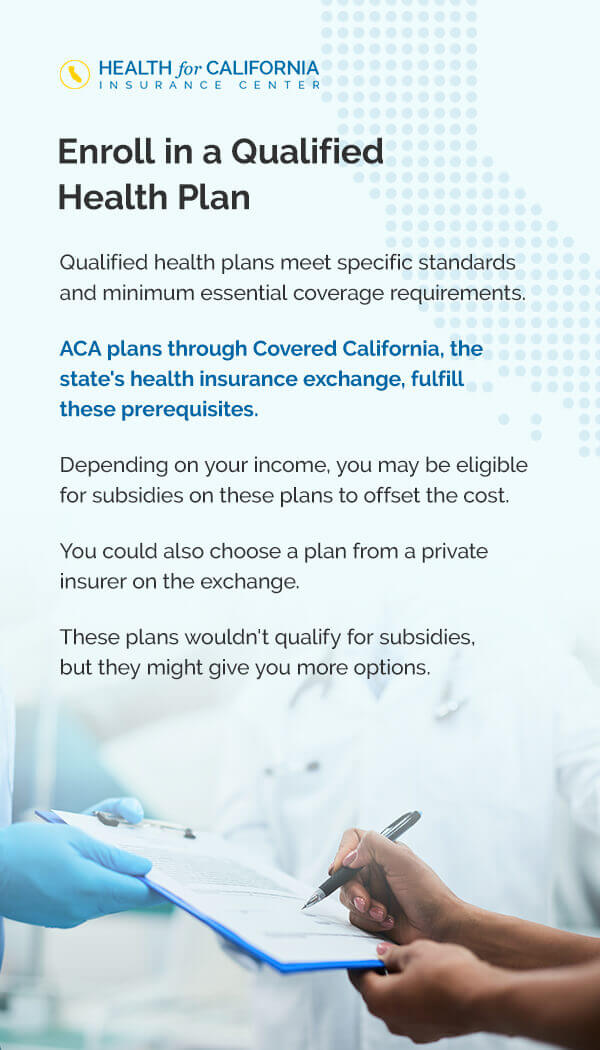Health Insurance Penalty in California
Posted: December 19, 2024

The California state government requires residents to have health insurance, or they may face a tax penalty. The options are either enrolling in a qualified health insurance plan or paying the tax penalty, subject to some exceptions. Having health insurance is the better option since it provides many benefits.
It’s a good idea to understand the tax implications of not having health insurance. Health for California helps Californians get the health coverage that’s right for them.

Is There a Fine for Not Having Medical Insurance in California?
There is a tax penalty for not having health insurance in California. The insurance penalty, also called the uninsured health care penalty or uninsured tax penalty, is a fee you must pay if you do not have a qualifying health insurance plan for a tax year. These penalties used to be in place at a federal level with the Affordable Care Act, popularly known as Obamacare, in 2014. They required most legal residents or United States citizens to purchase qualifying health insurance or pay a tax penalty.
The Trump administration rescinded this penalty in 2019. Several states have since created mandates to reinstate it. California is one of those states that added a tax penalty for uninsured people and businesses starting with the 2020 tax year.
Many people already have qualifying health insurance coverage. They may get this through their employers or public programs like Medi-Cal and Medicare. If you do not have this kind of coverage, the mandate requires you to purchase insurance, typically through one of two avenues.
- A federal or state-run health benefits exchange: These platforms, like Healthcare.gov and Covered California, have plans that meet requirements for avoiding penalties. Lower-income families may also qualify for tax credits or subsidies that can apply to plans from a health benefits exchange.
- Private insurance companies: Private companies may be more expensive and won’t qualify for subsidies, but you might have more options to choose from.
As a California resident, you should carry insurance throughout the year with no gaps in coverage of 90 days or more. Otherwise, you may face a tax penalty when you file your tax return. There are some exemptions to California’s penalty, which we’ll discuss later.
What Is the Penalty for Not Having Health Insurance?
The cost of the tax penalty for being uninsured varies depending on your income, the length of time you were uninsured and the size of your household. The state will assess the fee in one of two ways, depending on whichever is higher:
- A flat amount based on the number of people in the household: $900 per adult 18 years or older and $450 per dependent child. A family of four without adequate health insurance coverage could face a penalty of at least $2,700.
- A percentage of the household income: 2.5% of all gross household income over the tax filing threshold.
Both options are prorated according to how long you were uninsured. If you were only uninsured for one month, you pay one-twelfth of the fee. The state offers an estimator tool to help you understand how much your penalty for no health insurance might be.
Why Do I Have an Insurance Penalty?
If you see an insurance penalty on your W-2, it is because you did not have health insurance during that tax year. In California, this method of assessment began in January 2021.

Residents must maintain minimum essential coverage (MEC) for themselves and their dependents. The MEC is a defined coverage required to comply with the individual mandates under the ACA. There are many options, including:
- Employer-sponsored plans: Generally, employers with at least 50 employees must offer MEC to full-time employees and their dependents. Most of these plans meet the MEC threshold.
- COBRA plans: The plan allows covered employees and their families to continue their employer-sponsored health insurance after losing coverage due to specified events. The continuation coverage is temporary and could meet the MEC threshold.
- Covered California plans: Covered California partners with 11 different plans to provide coverage to Californians. These plans have varying coverages in different counties, allowing you to choose depending on your needs.
- Retiree plans: Retirees may qualify for retiree health insurance if they are not eligible for Medicare. Most of these options comply with the mandatory health insurance requirements.
- Family and individual plans: Some of the individual and family coverage you purchase through insurance carriers meets the MEC requirement. This includes plans purchased through Health for California.
- Full-scope Medi-Cal or Medicaid: Federal and state programs like Medicaid and Medi-Cal provide coverage to low-income earners and their families. Pregnant persons and individuals with disabilities may also qualify. These programs pass the MEC threshold.
- Medicare Part A and Medicare Advantage plans: Health insurance plans such as Medicare Part A and Medicare Advantage can provide minimum essential coverage. These plans generally apply to patients with certain conditions and in certain facilities.

Why Does California Have an Insurance Penalty?
California began using insurance penalties for purposes similar to those of the ACA. Individual mandates aimed to encourage young, healthy people to get or stay insured. Research suggests that eliminating the penalty can reduce the number of people insured and increase premiums.
When coverage is only for older, sicker individuals, premiums tend to rise since those enrolled have higher, more expensive needs. Enrolling more young, healthy people spread out the costs, reducing premiums for everyone. Tax credits or subsidies on qualifying plans further encourage enrollment by lowering the individual cost of coverage.
After the Trump administration eliminated the federal mandate in 2019, California implemented its version to fund more affordable initiatives and encourage insurance enrollment.
How Are Insurance Penalties Assessed?
Previously, the tax filing process involved checking a box that stated whether you had insurance during the previous year. Now, you will see the uninsured health insurance penalty listed on your W-2 or will otherwise need to pay it when filing your taxes.
The California Franchise Tax Board applies the taxes and assesses each month if an individual fails to enroll in health coverage throughout the year. The calculation is done per member of the household who did not have health insurance or exemption for a month during the year. Depending on the plan type, there are different forms for filing state and federal taxes. Individuals who received premium subsidies must also file a tax return regardless of whether their income creates a tax return filing requirement.

What Can You Do to Avoid an Insurance Penalty?
If you want to avoid the California insurance penalty, you must enroll in a qualified health plan or qualify for an exemption.

1. Enroll in a Qualified Health Plan
Qualified health plans meet specific standards and MEC requirements. ACA plans through Covered California, the state’s health insurance exchange, fulfill these prerequisites. Depending on your income, you may be eligible for subsidies on these plans to offset the cost. You could also choose a plan from a private insurer on the exchange. These plans wouldn’t qualify for subsidies but might give you more options.
Typically, the open enrollment period for California occurs between November and January. If you miss this window, you can apply during the special enrollment period if you’ve experienced a qualifying life event. Some examples include the following.
- Losing health insurance: You may lose existing coverage if you become unemployed, age out of a parent’s plan, lose Medi-Cal due to an increase in income or return from active military duty. In these cases, you must have lost your coverage involuntarily.
- Getting married or having a baby: Getting married, entering a domestic partnership, having a baby or bringing a child into the home through adoption or foster care can also qualify you for special enrollment.
- Moving to or within California: If you permanently moved to California from another state, you can get special enrollment. You may also qualify if you move within California to an area with at least one new plan that wasn’t available at your previous residence.
Other qualifying life events include gaining citizenship or lawful presence, being released from incarceration and being a Native American or Alaska Native. You may come across short-term health insurance plans. Unfortunately, they are not qualified health plans and won’t help you avoid the insurance penalty.
As you prepare for the upcoming tax season, you will need specific documents to prove that you and the members of your household had qualifying health insurance coverage. These include Forms 1095-A, 1095-B and 1095-C. You likely received these in the mail, but if you can’t find them, check with your insurance provider or employer. For employer-sponsored plans, these documents typically come from the employer.
2. Have a Valid Exemption
You may be exempt from paying a tax penalty in a few circumstances. They typically fall under three categories — religious conscience, affordability and hardship. You may be eligible for an exemption if you meet the following criteria.
- The coverage is unaffordable: If the lowest-cost plans on the Covered California marketplace or through an employer exceed a specific percentage of your individual or household income, they are unaffordable. In 2022, this value is 8.09% for individuals and households.
- You had a short coverage gap: A short coverage gap means you are uninsured for fewer than three consecutive months during the year.
- Your income is lower than the state threshold for tax filing: If your income is lower than the state tax filing requirement, you may not need to file taxes or pay a penalty for not having health insurance.
- You were incarcerated: You may be exempt from the tax penalty if you were incarcerated.
- You are a member of a Native American tribe: You may be exempt from the tax penalty if you belong to a federally recognized Native tribe.
- You experienced general hardship: Some circumstances may have prevented you from obtaining qualified insurance. If you experienced these hardships, such as homelessness, eviction, domestic violence, unpaid medical bills or the death of a close family member, you might be exempt from the tax penalty.
- You are a member of a religious sect: You may be exempt from the tax penalty if you are a member of a specific religious group or a health care sharing ministry.
If you plan to claim one of these exemptions, you may need to submit an application and documentation. Speak with a tax professional about valid exemptions to determine whether one may apply to your situation.
Sign up for Insurance With Health for California
Health insurance is one of the most crucial purchases you will make. In California, you may need to purchase individual health insurance in various circumstances. Health insurance coverage offers many benefits, but it is also a mandatory requirement in some cases.
Health for California helps Californians find suitable health care coverage based on your unique needs. We offer a fast, easy and accurate online application process. You also have free access to our agents who will answer any questions and ensure you and your family can enjoy quality health coverage. Request a free quote today to get started.
